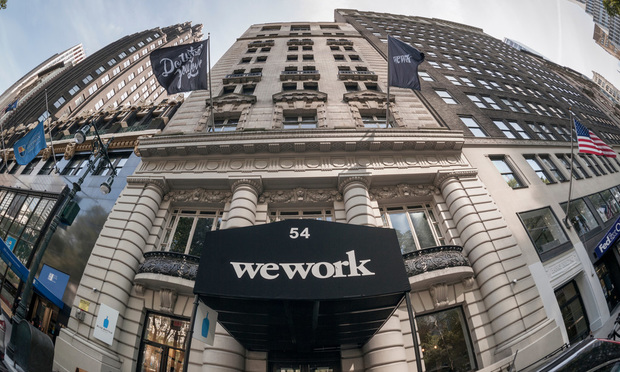Not many businesses dealt with what WeWork did in the past year.
In addition to the COVID-19 pandemic, the company weathered controversy that brought down founder and CEO Adam Neumann.
But Peter Greenspan, global head of Real Estate at WeWork, told Savills USA Managing Director Ken Biberaj in a recent podcast that the firm didn’t lose focus on what was important.
“We didn’t allow that noise to get in the way of what our vision has always been, which was flexibility and office space innovation in how people work,” Greenspan said.
After a turbulent time, Greenspan says that WeWork focused on its brand and regaining the trust of its landlords, members and the industry.
“We knew that we were the leader in flex [space],” Greenspan says. “We knew that we had innovation deep in our soul when it came to work and what it means to have people in an office. We also knew that the hypergrowth and the business model had to be reorganized.”
Following Neumann’s departure, former CEO of GGP Sandeep Mathrani took the helm at WeWork. “He came in with a laser focus on profitability and what the math said,” Greenspan said.
WeWork’s team spent the last year looking at its building and talking to landlords. “Unlike many of the other companies and tenants that had to just shut down, we didn’t turn to bankruptcy,” Greenspan says. “We didn’t turn to litigation. We got on the phone with all of our landlords and our members.”
WeWork also divested all of its schools and other businesses. Glassman says WeWork didn’t have the focus or capital to deal with these ventures. According to Greenspan, the company cut its selling, general and administrative expenses, jettisoned “unnecessary systems” and rightsized its labor force.
Glassman said WeWork did these “very, very difficult and painful” things intending to end the year with a strong balance sheet. “I think our balance sheet is as strong as any tenant in the market right now,” he says.
Glassman adds that WeWork has a profitable portfolio in great locations. “We’re a totally different company today than we were a year ago, and I’ve been here the whole time,” he says. “I’ve been here six years, and I’ve seen the ebb and flow.”
The Changing Coworking Environment
WeWork is regaining its sea legs amid a changing marketplace for coworking office space. When COVID-19 hit, flex spaces sat empty. But a school of thought emerged that coworking would be an essential part of the new way of working, making it easier for firms to socially distance their employees and serving as outposts in the suburbs.
The debate continues, though, as to coworking’s ultimate role.
In a recent COVID-19 Commentary, ASB Real Estate Investments Chief Investment Officer David Quigley, Senior Vice President and Portfolio Manager Larry Braithwaite and Head of Research Cassidy Toth, write that coworking might be the most at-risk segment in the office sector.
“The pandemic has precipitated a meaningful pullback in demand for this month-to-month space as tenants revert to the rent-free work from home alternative,” they write.
On the other side of the debate, while coworking may see less demand from freelancers, it could get a boost from companies looking to utilize the hub-and-spoke model.
Joe Brady, CEO Americas for The Instant Group, a workspace innovation firm, sees an opportunity for some firms to bring their office costs down to five or six percent by relying on spokes, which could be coworking spaces.
Meanwhile, larger CRE firms are also making bets on coworking and entering the market with their own offerings. To name one example, Cushman & Wakefield recently launched an alliance with coworking firm Industrious to offer landlords integrated management of traditional and coworking space.
